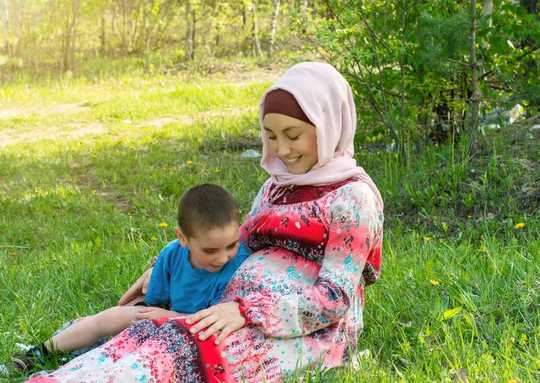 New research shows that diabetes is a family affair. (Shutterstock)
New research shows that diabetes is a family affair. (Shutterstock)
You probably know someone with diabetes, as it is an increasingly common disease. In 2017, more than 425 million adults were living with diabetes, and more than 1,106,500 children were living with Type 1 diabetes, globally.
There are three common types of diabetes. In Type 1, the body’s immune system attacks the cells that make insulin, the hormone that gets blood sugar (our body’s fuel) where it needs to go. In Type 2, the body makes insulin but the insulin cannot do its job. In both cases, blood sugar levels go up.
A third kind of diabetes, gestational diabetes, is temporary during pregnancy. However, our recent studies show that diabetes in one family member is related to diabetes in other family members.
Gestational diabetes in mothers is linked to future diabetes not only in the mothers themselves, but also in their partners and children.
Get The Latest By Email
Couples share diabetes risk
In most cases, Type 2 and gestational diabetes are related not only to genetics, but also to lower physical activity and less healthy ways of eating. Improving eating and activity can cut Type 2 diabetes risk by half. A lot of studies have shown that many women with gestational diabetes go on to develop Type 2 diabetes in the decade after pregnancy.
 Couples often follow the same lifestyle patterns. (Shutterstock)
Couples often follow the same lifestyle patterns. (Shutterstock)
We looked at data from about 70,000 couples who were parents in Quebec. We found that if the mother had gestational diabetes, the father was 30 per cent more likely to develop Type 2 diabetes in the 10 years after pregnancy.
If the mother had both gestational diabetes and gestational hypertension — temporary high blood pressure during pregnancy — the father was 80 per cent more likely to develop Type 2 diabetes in the future.
Couples share physical activity, eating and weight patterns. We think that is why they share diabetes risk.
It’s time to share action: to improve health behaviours together and try to prevent diabetes development in the future.
What about the kids?
We had information on the children of the couples we studied, from birth to 22 years old. More than 90 per cent of diabetes that starts before the age of 22 in most Canadian provinces is Type 1, not Type 2.
The exception is Manitoba where there are many Indigenous Canadians, an established link with diabetes and a high occurrence of Type 2 in young people.
Studies from Alberta show a link between gestational diabetes in mothers and Type 2 in kids. One study in Sweden showed a link between having either Type 2 or gestational diabetes in the mother and the development of Type 1 in the kids.
We found that between birth and 22 years, the kids of mothers with gestational diabetes were twice as likely to develop Type 1 diabetes. If you had 5,000 young people whom you watched for two years, our results indicate that two of them would develop Type 1 if their mom did not have gestational diabetes. Four or five would develop Type 1 if their mom did have gestational diabetes. So it is rare, but it is important.
 A small percentage of children whose mother had gestational diabetes will go on to develop Type 1 or Type 2 diabetes. (Shutterstock)
A small percentage of children whose mother had gestational diabetes will go on to develop Type 1 or Type 2 diabetes. (Shutterstock)
A study also from Quebec shows that one quarter of young people who develop Type 1 come to the hospital in a medical crisis the first time they are diagnosed. The early signs of Type 1 may be missed: being really thirsty, having to urinate more often, a bit of blurry vision, some fatigue you can’t explain.
Understanding the link with gestational diabetes might be another useful piece of the puzzle — to push young people, their families and their healthcare providers to consider the possibility of diabetes, just as they do when their parents are known to have Type 1 or Type 2.
Gestational diabetes is a family affair
We don’t yet know why there is a link between gestational diabetes in mothers and Type 1 in young people. The important thing to remember though is that gestational diabetes is a family affair.
Future Type 2 diabetes can be prevented in many family members within the home environment — by eating more home-cooked healthy meals and lots of fruits and vegetables, by reducing fried foods and eating out and with a whole family emphasis on being active.
 Improving eating and activity can cut Type 2 diabetes risk by half. (Unsplash/igor miske), CC BY
Improving eating and activity can cut Type 2 diabetes risk by half. (Unsplash/igor miske), CC BY
Type 1 diabetes, though rare, might also be diagnosed earlier in kids and teens, with an awareness of the link to mom’s gestational diabetes.
Finally, we need greater effort at the public health and policy levels to build awareness of diabetes risk and to support community-based diabetes prevention programs.![]()
About The Author
Kaberi Dasgupta, Associate Professor of Medicine, McGill University; Physician-Scientist and Director of the Centre for Outcomes Research and Evaluation at the McGill University Health Centre, McGill University
This article is republished from The Conversation under a Creative Commons license. Read the original article.
books_diabetes







